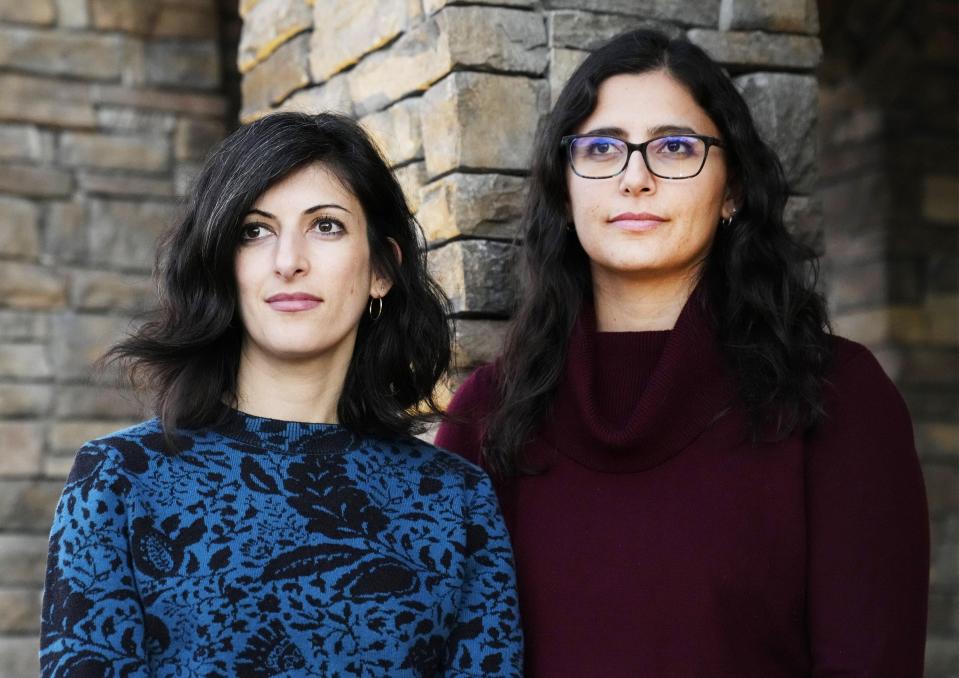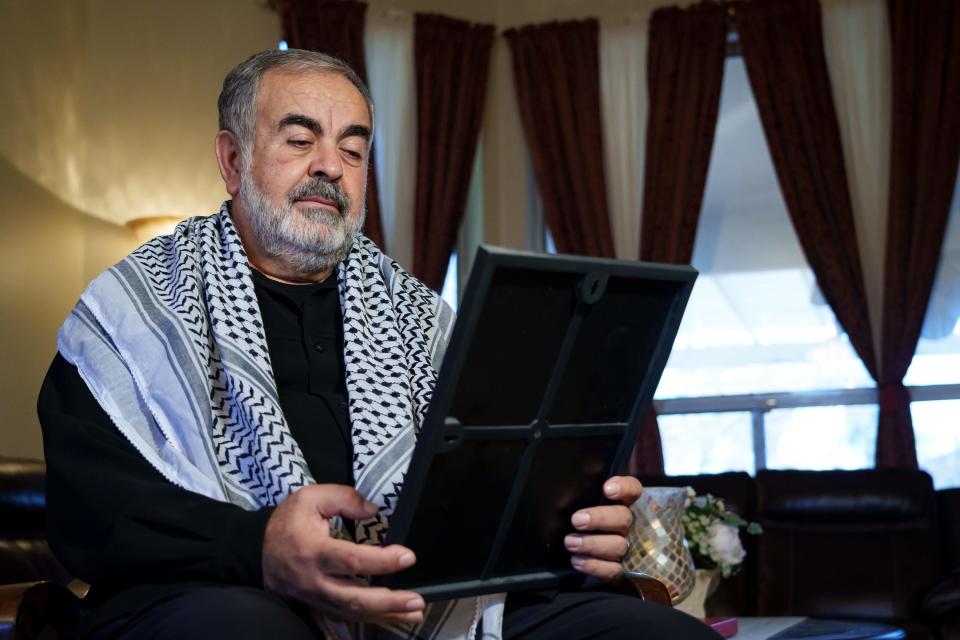After dozens of relatives were killed in Gaza, Arizonan seeks help for family still there
- Oops!Something went wrong.Please try again later.
Mohamed El-Sharkawy has lived in the U.S. for 37 years.
But like many Palestinian Americans, El-Sharkawy, 63, still has relatives living in Gaza, including four nieces and their families. Now, El-Sharkawy said, those relatives are battling to stay alive amid Israel's bombardment and siege of the territory in response to the Oct. 7 deadly rampage by Hamas.
El-Sharkawy, a Phoenix resident and aviation engineer, is trying to secure safe passage for relatives from Gaza with help from members of Arizona's congressional delegation. A nephew and a niece were able to come to the U.S. in November with help from the office of U.S. Rep. Greg Stanton, D-Ariz.
For now, many of El-Sharkawy's relatives remain in Gaza, living in deplorable and dangerous conditions due to limitations on who the federal government can help leave Gaza to come to the U.S., according to El-Sharkawy and Stanton's office.
El-Sharkawy said he is among many Palestinian Americans in Arizona and other parts of the U.S. who have sought help from the U.S. government to get relatives out of Gaza since the war started.
Some family members of U.S. citizens have complained that guidance from the federal government has been inadequate, according to USA TODAY.
In December, two Palestinian American families sued the Biden administration, saying the U.S. government has not done enough to help evacuate U.S. citizen relatives stuck in Gaza.
In El-Sharkawy's case, the relatives in Gaza are not U.S. citizens, which further limits the role the U.S. can play in helping them secure safe passage.
Arizonans concerned for relatives living in Palestinian territories
About 134,000 to 175,000 people in the U.S. in 2020 identified as being of Palestinian descent, according to the U.S. Census Bureau. Many still have relatives in the Palestinian territories.
Phoenix residents and sisters Lina Bearat, 33, and Hanin Bearat, 39, have relatives in the West Bank, including their parents.
As Palestinian Americans, watching news coverage of Gaza has taken a huge emotional toll, they said.
"To see how we've been dehumanized," Lina Bearat said. "A Palestinian life doesn't matter as much. And so this is what really hurts as a Palestinian American."

They also are concerned about relatives in the West Bank. Since the war began, increased violence in the West Bank has forced their families to stop tending their olive groves, which they depend on for economic survival. Their younger cousins also have stopped going to school.
"All these things are impacting our family in the West Bank," Lina Bearat said. "That's not really getting as much coverage because of just the scale of what's going on in Gaza."
'Hungry, cold and scared': Arizonan describes his relatives' lives in Gaza
Israel's air and ground assault began after Hamas launched attacks from Gaza across the border into southern Israel. The attacks killed 1,200 people, including 33 children, and injured thousands. Hamas also took about 240 people hostage.
The air and ground assault by Israel against Hamas prompted by the Oct. 7 attacks has killed more than 20,000 Palestinians, a large share of them children, and displaced most of the Hamas-controlled territory's 2.3 million people, according to USA TODAY.
About 50 members of El-Sharkawy's extended family have been killed in Gaza, including an entire family killed when a bomb destroyed an apartment building in Gaza City where they were living in early November, he said. Those killed in the blast were the family of the husband of one of his nieces living in Gaza City, El-Sharkawy said.
His niece's husband's family "were all wiped out — everybody," El-Sharkawy said. She lost "her father-in-law and mother-in-law, all of the kids," El-Sharkawy said.
It is common for entire extended families in Gaza to live in a single compound, El-Sharkawy said, explaining why so many members of the same family were killed in the blast.
El-Sharkawy said two of his nieces in Gaza are the daughters of a sister who lives in Jacksonville, Florida. The other two are daughters of a sister in Spain.
El-Sharkawy said his four nieces and their immediate families still in Gaza have all been displaced from their homes in northern Gaza. The families include 10 children, among them a 1-year-old.
"These kids are hungry, cold and scared," El-Sharkawy said.
El-Sharkawy said the neighborhood where he grew up in Gaza City has been reduced to rubble by the shelling.
Some of El-Sharkawy's relatives were living in Jabalia, in the northern part of Gaza. But when the bombardment started, they fled to nearby Gaza City. The four nieces and their families are now living in Rafah, a city in southern Gaza near the border with Egypt, El-Sharkawy said. Hundreds of thousands of people who also fled the bombardment are starving in crowded, squalid conditions, according to media reports.
El-Sharkawy said three of his nieces and their families live in tents with little to eat. The fourth niece and her family are living in a U.N.-run school providing shelter to displaced Palestinians. The school also has been hit by Israeli airstrikes, according to media reports.
Photographs that El-Sharkawy shared show one niece, 36-year-old Doaa Nijim, frying tomatoes and onions on a wood stove, and washing clothes in a plastic paint bucket. Another photo shows Doaa Nijim's son, 12-year-old Rezeq Nijim, curled up asleep on a thin mat on the floor.
A spoon of sugar is sometimes all Doaa Nijim has to feed her children as a sweet, El-Sharkawy said.
The entire population of the Gaza Strip is facing acute food insecurity, and more than half of a million people in the Gaza Strip are starving due to the war, according to an Integrated Food Security Phase Classification report.
"They are crying day and night, not knowing if they will make it the next day," said El-Sharkawy during an interview at a restaurant in Ahwatukee Foothills, where he lives. "The hardest part is their kids crying, and they can't comfort them. They cannot tell them tomorrow will be better."
Nephew makes asylum claim, placed in detention after US arrival
El-Sharkawy said he called the offices of Stanton and U.S. Sen. Mark Kelly, D-Ariz., to ask for the U.S. government's assistance in evacuating his relatives in Gaza.
El-Sharkawy came to the U.S. in 1986 after earning an engineering degree in Cairo. He founded the Arizona Muslim Police Advisory Board. The board's goal is to facilitate communication between law enforcement agencies and the Muslim population, he said.

Through his work with the board, El-Sharkawy said, he has had a long relationship with Stanton, the former mayor of Phoenix, which is why he reached out to him now. El-Sharkawy said he also became acquainted with Kelly's wife, former U.S. Rep. Gabrielle Giffords, through his work with the board.
Representatives from Stanton and Kelly's offices confirmed that El-Sharkawy had requested help bringing relatives to the U.S. from Gaza.
Kelly spokesman Alex Wood said Kelly's constituent services team is assisting El-Sharkawy, but he declined to share details of the communications for privacy reasons.
Stanton spokesperson Allison Childress said El-Sharkawy first contacted Stanton's office on Oct. 13 about a niece and nephew trying to leave Gaza.
The U.S. government does not provide departure assistance for noncitizens, Childress said. But the niece and nephew managed to cross from Rafah into Egypt, where they received 72-hour temporary visas, Childress said.Representatives from Stanton's office contacted the U.S. Department of State and the Egyptian government about extending the temporary visas, Childress said. Stanton raised the case directly with U.S. Assistant Secretary of State for Near Eastern Affairs Barbara Leaf on Nov. 8., Childress said.
"We worked to move the niece and nephew’s appointment from November 19 up to November 13 at the U.S. Embassy in Cairo for them to interview for visas," Childress said in an email.
On Nov. 14, the nephew’s student visa and the niece’s 60-day visitor visa were approved. They flew to the U.S. shortly after, Childress said.
The niece and nephew are both now on U.S. soil, Childress said.
However, because the nephew arrived more than 60 days before the start of classes in January at Florida State College, where he plans to attend school, he was denied entry at John F. Kennedy International Airport in New York City, Childress said.
The nephew then claimed asylum, Childress said. He is in detention awaiting adjudication of his asylum case, Childress said. Stanton's office informed the U.S. Department of Homeland Security and the State Department about the ongoing case.
"They have retained legal counsel, at our recommendation," Childress said.
Stanton's office also has contacted the State Department about El-Sharkawy's other nieces and their young children. They missed a travel visa appointment in Jerusalem due to the conflict, Childress said.
They are attempting to move the appointment to the U.S. Embassy in Cairo, Childress said.
"But at this point our office is only able to assist once the family has moved to a third country with a U.S. Embassy in it," Childress said.
Helping out: Arizona volunteers' donations are meant to bring warmth to war-torn Gaza
The U.S. government is only able to assist U.S. citizens in Gaza and their immediate family members, defined as parents, spouses, unmarried children and siblings under 21, to get on published lists of people approved to depart from Gaza, Childress said. The published lists are posted on the Facebook page of the Palestinian General Authority for Crossings and Borders.
"The situation in Gaza remains fluid, and there have been delays and periodic, unexpected closures of the Rafah crossing. The U.S. does not control the crossing, and every day, it's a series of negotiations and discussions about process, procedure, and security vetting," Childress said in the email. Childress said Stanton's office "is exploring all available options" to help El-Sharkawy and his family in Gaza.
Reach the reporter at daniel.gonzalez@arizonarepublic.com.
This article originally appeared on Arizona Republic: Phoenix resident seeks help getting relatives out of Gaza

